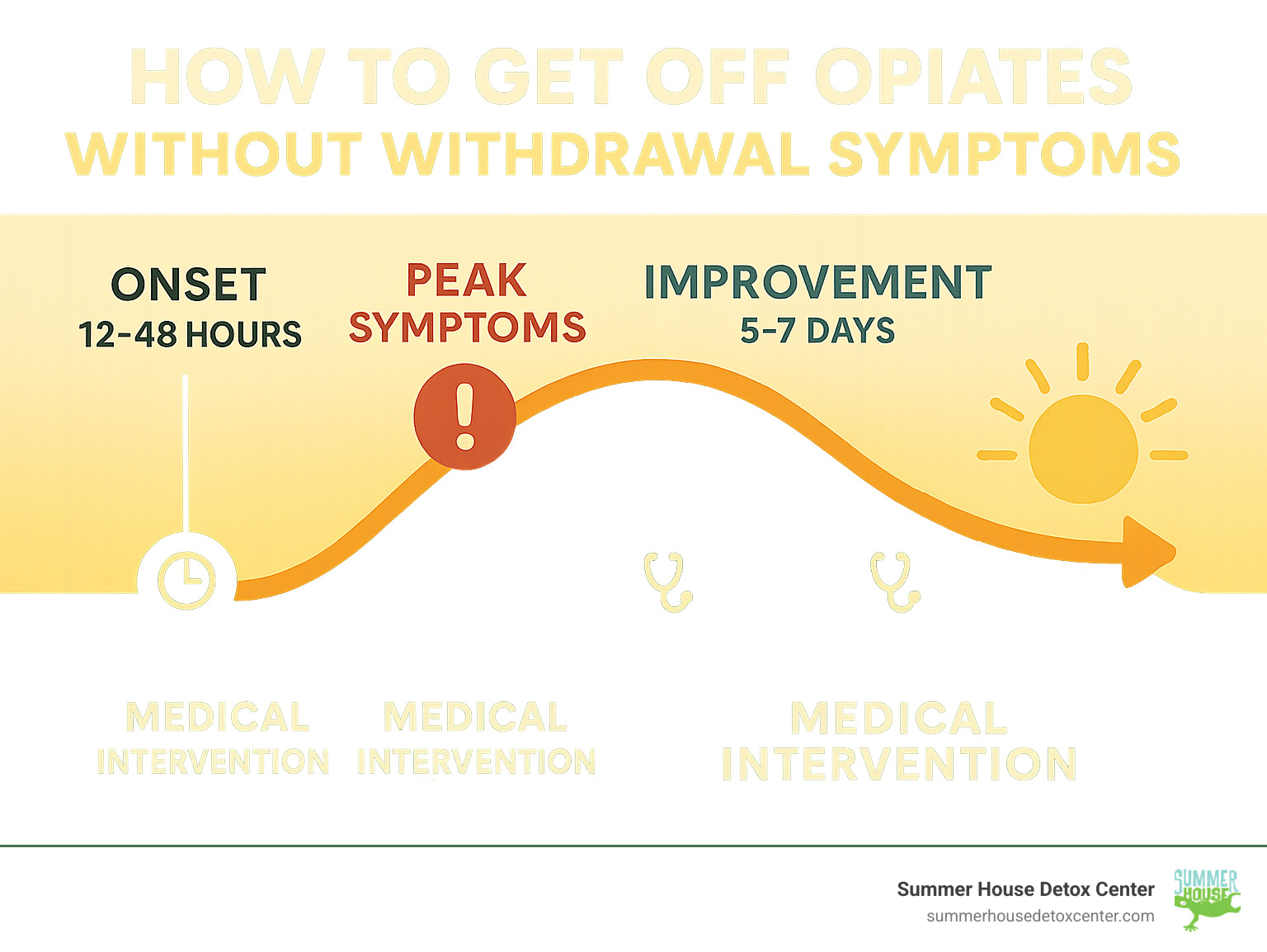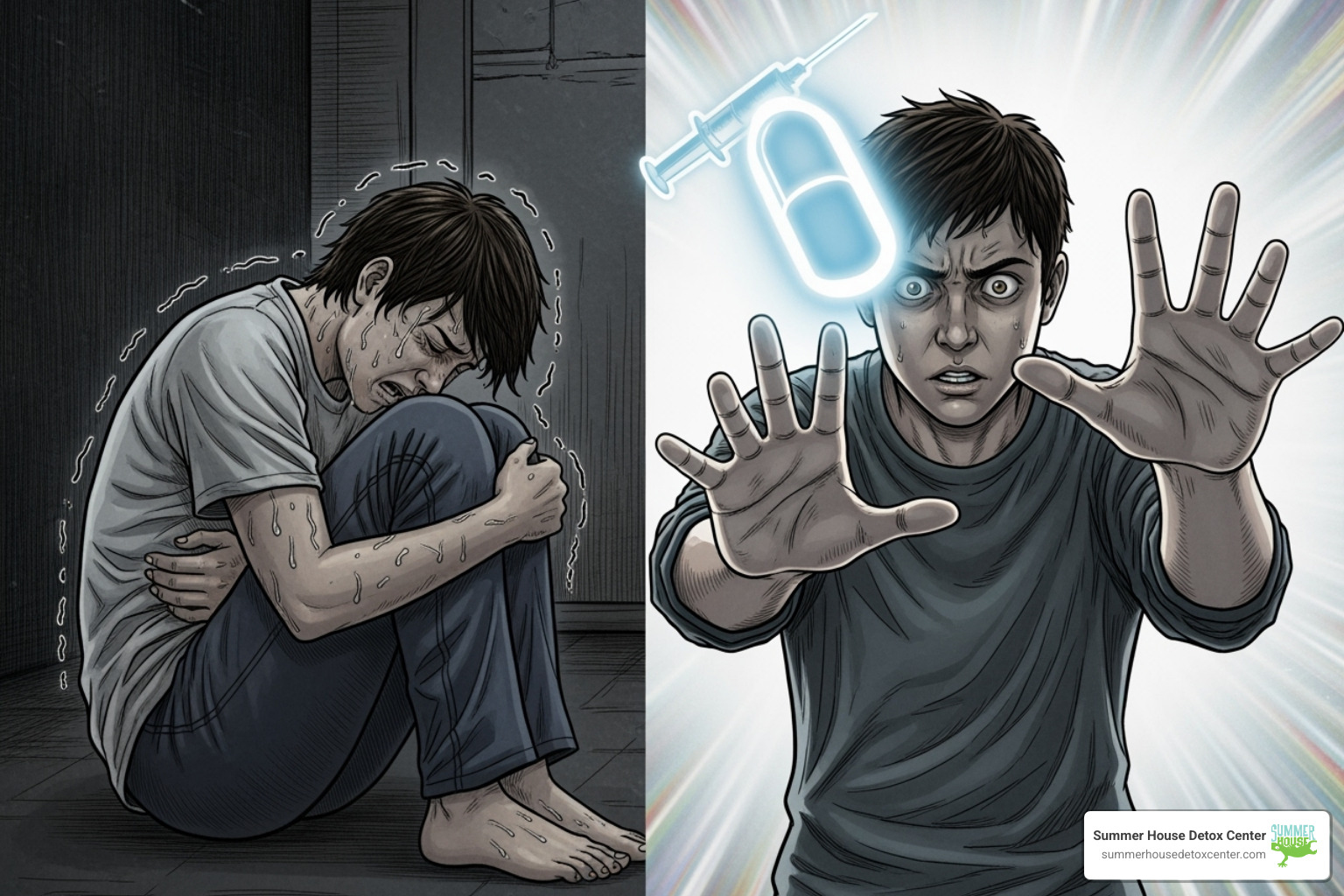The Reality of Opioid Withdrawal: Why Fear Shouldn’t Keep You Trapped
How to get off opiates without withdrawal symptoms is a common goal, and it’s achievable with the right medical support. While eliminating every symptom isn’t always possible, a medically supervised detox can make the process comfortable and manageable.
Quick Answer: Getting Off Opiates with Minimal Withdrawal
- Medical supervision is essential – Never attempt to quit “cold turkey” alone
- Gradual tapering works best – Slowly reducing doses over weeks or months
- Medications can help – Buprenorphine, clonidine, and symptom-specific treatments
- Timeline matters – Acute symptoms last 5-7 days, but planning takes longer
- Professional detox centers provide 24/7 support and comfort measures
The fear of withdrawal is real and keeps many people trapped in a cycle of use. But modern medical detox has changed everything. For long-term users, a medically supervised taper can reduce symptoms by 10 to 30 times compared to quitting alone.
In Florida, treatment centers in Miami are pioneering comfortable detox approaches. You don’t have to suffer. The key is working with professionals who understand the withdrawal timeline—symptoms typically start 12 to 48 hours after the last dose and peak between 24 to 96 hours. With proper support, this process is manageable, not unbearable.

Simple how to get off opiates without withdrawal symptoms glossary:
- opiate withdrawal symptoms
- does suboxone help with opiate withdrawal symptoms
- does gabapentin help with opiate withdrawal symptoms
Understanding Opioid Withdrawal: Why a Taper is Essential

When your body becomes dependent on opioids, it’s not a moral failing—it’s biology. Physical dependence develops as your system adapts to the medication’s presence. This is different from addiction, which involves compulsive drug-seeking. Many people in Miami with legitimate prescriptions find themselves physically dependent without any addictive behaviors.
Over time, your body also develops tolerance, meaning you need more of the drug for the same effect. This leads to serious risks with long-term use, including a paradoxical condition called opioid-induced hyperalgesia, where long-term use actually makes you more sensitive to pain. Other complications include severe constipation and breathing problems.
When your body doesn’t get the expected dose, withdrawal begins.
- Early withdrawal symptoms (starting 12-48 hours after the last dose) feel like a bad flu: muscle aches, sweating, a runny nose, restlessness, and anxiety.
- Late withdrawal symptoms (peaking at 24-96 hours) are more intense: nausea, vomiting, diarrhea, and stomach cramps.
While not typically life-threatening, complications like severe dehydration can be serious, especially in South Florida’s humid climate. This is why professional medical supervision is critical. The Opioid Withdrawal – StatPearls – NCBI Bookshelf provides more medical detail, but the takeaway is simple: your body needs support to readjust.
The Dangers of Quitting “Cold Turkey”
Quitting abruptly, or “cold turkey,” sounds simple but carries serious risks. It forces you to experience withdrawal at full intensity, creating an overwhelming urge to use again and a high increased relapse risk.
The biggest danger is overdose. When you stop using, your tolerance drops quickly. If you relapse and take your previous dose, your body can’t handle it. This is a primary cause of accidental overdoses in Florida and nationwide. Gradual reduction is a much safer approach, allowing your body to adjust slowly.
How Duration and Dosage Affect Your Withdrawal Experience
Your withdrawal experience is unique, influenced by several factors.
- Short-term vs. long-term use: Using for two weeks or less may result in minimal symptoms. Months or years of use require a more gradual taper.
- High vs. low dose: Higher daily doses generally lead to more intense withdrawal.
- Type of opioid: Short-acting opioids (e.g., prescription pills) cause intense but shorter withdrawal, while long-acting ones (e.g., methadone) lead to a more drawn-out process.
- Individual physiology: Your metabolism, overall health, and genetics all play a role.
This is why a personalized tapering schedule is essential. A professional might reduce doses by 10-25% every few days for short-term users, or every 1-3 weeks for long-term users, ensuring the process is as comfortable as possible.
The Safest Way to Get Off Opiates Without Withdrawal Symptoms: Medical Detox
If you’ve tried to quit before, you know how overwhelming withdrawal can be. How to get off opiates without withdrawal symptoms is far more achievable with a medical team by your side.

Medical detox isn’t magic; it’s science and support. At Summer House Detox Center in Miami, we use medically supervised tapering, gradually reducing your opioid intake to minimize the shock to your system. This requires personalized detox planning, as everyone’s needs are different. We consider the type of opioid, duration of use, dose, and your overall health.
A key part of our approach is shared decision-making. You are an active partner in your recovery. Our staff, some of whom have walked this path themselves, collaborate with you, adjusting the plan based on your comfort and progress. We offer both slow tapering (reducing the dose by 10-25% every 1-3 weeks) for long-term users and fast tapering (reducing by 20-25% every few days) for short-term users, always prioritizing your well-being.
What Medications Can Help You Get Off Opiates Without Withdrawal Symptoms?
Medication-Assisted Treatment (MAT) has revolutionized opiate detox. These are not “trading one drug for another” but are FDA-approved medications that ease withdrawal and reduce cravings.
- Buprenorphine (often in Suboxone) is a primary tool. It binds to opioid receptors to stabilize you, reducing cravings and withdrawal symptoms without the high. It’s now more accessible than ever in Florida.
- Lofexidine (Lucemyra) is a non-opioid that calms the nervous system, turning down the volume on symptoms like muscle aches, chills, and anxiety.
- Clonidine serves a similar purpose, helping manage sweating, hot/cold flashes, and restlessness.
We also provide medications for symptom-specific relief, such as nausea, insomnia, or muscle aches. Anxiety management may include non-addictive options like gabapentin. The goal is to make the process manageable so you can focus on healing. For more information, see The ASAM National Practice Guideline.
Creating Your Taper Plan: The Key to Getting Off Opiates Without Withdrawal Symptoms
Your taper plan is your roadmap, and it must be created with an expert. Consulting a doctor specializing in addiction medicine is essential for your safety. Never attempt a DIY detox.
Our medical team in Miami creates a dose reduction schedule custom to you. According to the Mayo Clinic, a taper is needed if you’ve used opioids for more than 7-10 days. For long-term users, we typically reduce the dose by 10-25% every one to three weeks. The goal is safe and comfortable progress, not speed.
Monitoring progress is constant. We use tools like the Clinical Opiate Withdrawal Scale to objectively measure your symptoms and make real-time decisions, adjusting the plan as needed. This flexibility is key to a successful taper that maintains your dignity and comfort. The Mayo Clinic’s guide on tapering off opioids offers more insight.
Holistic Support for a Comfortable Detox Journey
Medical interventions are key, but a holistic approach supports your entire well-being—mind, body, and spirit. These non-pharmacological strategies can significantly improve your comfort during detox.
- Nutrition and Hydration: Your body is rebalancing. Staying hydrated and eating healthy meals makes a huge difference, especially since dehydration is a common withdrawal complication.
- Light Exercise: Gentle movement like walking or stretching can alleviate restlessness, improve mood, and help you sleep.
- Relaxation Techniques: Deep breathing, guided imagery, or calming music can help manage anxiety and discomfort.
- Mindfulness: Focusing on the present moment can help you observe uncomfortable feelings without being overwhelmed by them.
- Mental Health Counseling: Opioid dependence often co-occurs with anxiety, depression, or trauma. Addressing these is crucial. Therapies like Cognitive Behavioral Therapy (CBT) help you develop coping skills and build resilience. Our team provides this vital support.
Building Your Support Network in Miami and Beyond
You don’t have to do this alone. A strong support network is vital for long-term recovery. In Miami and across Florida, numerous resources are available.
- Narcotics Anonymous (NA): This 12-step program offers a supportive community. You can find local meetings in the Miami area and throughout Florida at Narcotics Anonymous.
- SMART Recovery: An alternative to 12-step programs, SMART Recovery uses CBT principles to build self-reliance. Learn more at SMART Recovery.
- Substance Abuse and Mental Health Services Administration (SAMHSA): SAMHSA’s national helpline and website can help you find treatment and support services anywhere in Florida. Visit SAMHSA Find Support.
- Family Therapy and Support: Addiction impacts the whole family. Family therapy can heal relationships and create a supportive home environment.
- Local Community Resources: Our team at Summer House Detox Center can help you connect with local support groups and services in the Miami area.
Reaching out for help is a sign of strength. These systems provide a safe space to build a foundation for a fulfilling, opioid-free life.
Life After Tapering: Preventing Relapse and Ensuring Long-Term Success
Completing a medical detox is a monumental achievement, but it’s the first step in a lifelong recovery journey. The period immediately following detox is critical for long-term success.
A crucial safety warning: after detox, your tolerance to opioids is significantly lower. A relapse on your previous dose could cause a fatal overdose. It is vital to have Naloxone (Narcan) available and to ensure your loved ones know how to use it.
Many people also experience Post-Acute Withdrawal Syndrome (PAWS). These are subtle, fluctuating psychological symptoms like mood swings, anxiety, fatigue, or trouble concentrating that can last for weeks or months as your brain continues to heal. This is a normal part of the process, not a sign of failure.
This is why relapse prevention planning is essential. At Summer House Detox Center in Miami, we help you build a foundation for sustainable recovery.
Key components include:
- Ongoing Therapy and Counseling: Continuing with therapy like Cognitive Behavioral Therapy (CBT) helps address the root causes of substance use and equips you with coping skills for life’s challenges.
- Building a New Sober Lifestyle: Recovery is about creating a fulfilling life without substances. This means developing healthy routines, finding new hobbies, and rebuilding relationships. This new, positive life is the true answer to how to get off opiates without withdrawal symptoms leading you back to old patterns.
- Support Groups: Continued participation in groups like Narcotics Anonymous (NA) or SMART Recovery provides community, accountability, and encouragement. Sharing with others who understand is a powerful tool for staying motivated.
Recovery is a journey with ups and downs. With the right tools and support, a life free from opioid dependence is not just possible—it’s incredibly rewarding.
Frequently Asked Questions about Opiate Withdrawal
It’s normal to have questions about getting off opiates. The fear of withdrawal is powerful, but knowledge can help. Here are answers to some common questions.
Is it truly possible to have zero withdrawal symptoms?
The phrase “how to get off opiates without withdrawal symptoms” speaks to the desire for a painless process. While eliminating every sensation may not be realistic, medical detox aims to make the experience as comfortable as possible. Instead of an ordeal, think of it as a gentle transition. With careful tapering and supportive medications, the severe symptoms of “cold turkey” are dramatically reduced, allowing you to focus on healing, not just surviving.
How long does opioid withdrawal last?
The timeline varies, but it generally occurs in two phases:
- The Acute Phase: This involves the most noticeable physical symptoms. It usually starts within 12 to 48 hours of the last dose, peaks around 24 to 96 hours, and improves within 5 to 7 days. For long-acting opioids like methadone, this phase can last longer.
- Post-Acute Withdrawal Syndrome (PAWS): After the acute phase, some people experience lingering psychological symptoms like mood swings, anxiety, and fatigue. These can last for weeks or months as the brain continues to heal.
Why is a medically supervised taper safer than doing it alone?
Detoxing alone is rarely successful and can be dangerous. A medically supervised taper at a facility like Summer House Detox Center in Miami is the safest, most effective path.
- Professional Monitoring: We provide 24/7 monitoring of your vital signs and symptoms, ready to intervene if complications arise.
- Medication Access: You have immediate access to proven medications that are precisely dosed to manage your symptoms and maximize comfort.
- Emergency Support: We are equipped to handle any medical emergencies, such as severe dehydration or a mental health crisis, ensuring your safety.
- Psychological Care: Detox is a psychological process. We integrate mental health support and counseling to help you manage cravings and build resilience.
- Preventing Complications: We proactively manage risks, including the high potential for overdose if a relapse occurs after your tolerance has dropped.
Our experienced staff in Miami combines medical expertise with compassionate care, providing a safe and dignified environment for you to begin your recovery.
Conclusion
Your journey to freedom from opiates doesn’t have to be a nightmare. The hopeful truth is that learning how to get off opiates without withdrawal symptoms leading to relapse is possible with the right medical team.
The difference between going it alone and professional support is night and day. Medically supervised tapering, guided by a personalized plan, makes the process gentle and manageable. Supportive medications ease discomfort, while holistic care for your mind and body helps you heal completely.
Here in Miami and throughout Florida, you are not alone. Compassionate, effective treatment is available. You deserve to recover with dignity and comfort, surrounded by people who believe in you.
At Summer House Detox Center, we’ve seen countless individuals find that recovery is more manageable than they ever imagined. Our experienced team, including staff who have walked this path themselves, creates personalized detox plans that prioritize your comfort and safety.
The fear of withdrawal has held you captive long enough. Take the first step toward the opiate-free life you deserve.
Begin your journey to an opiate-free life with our specialized detox services.

